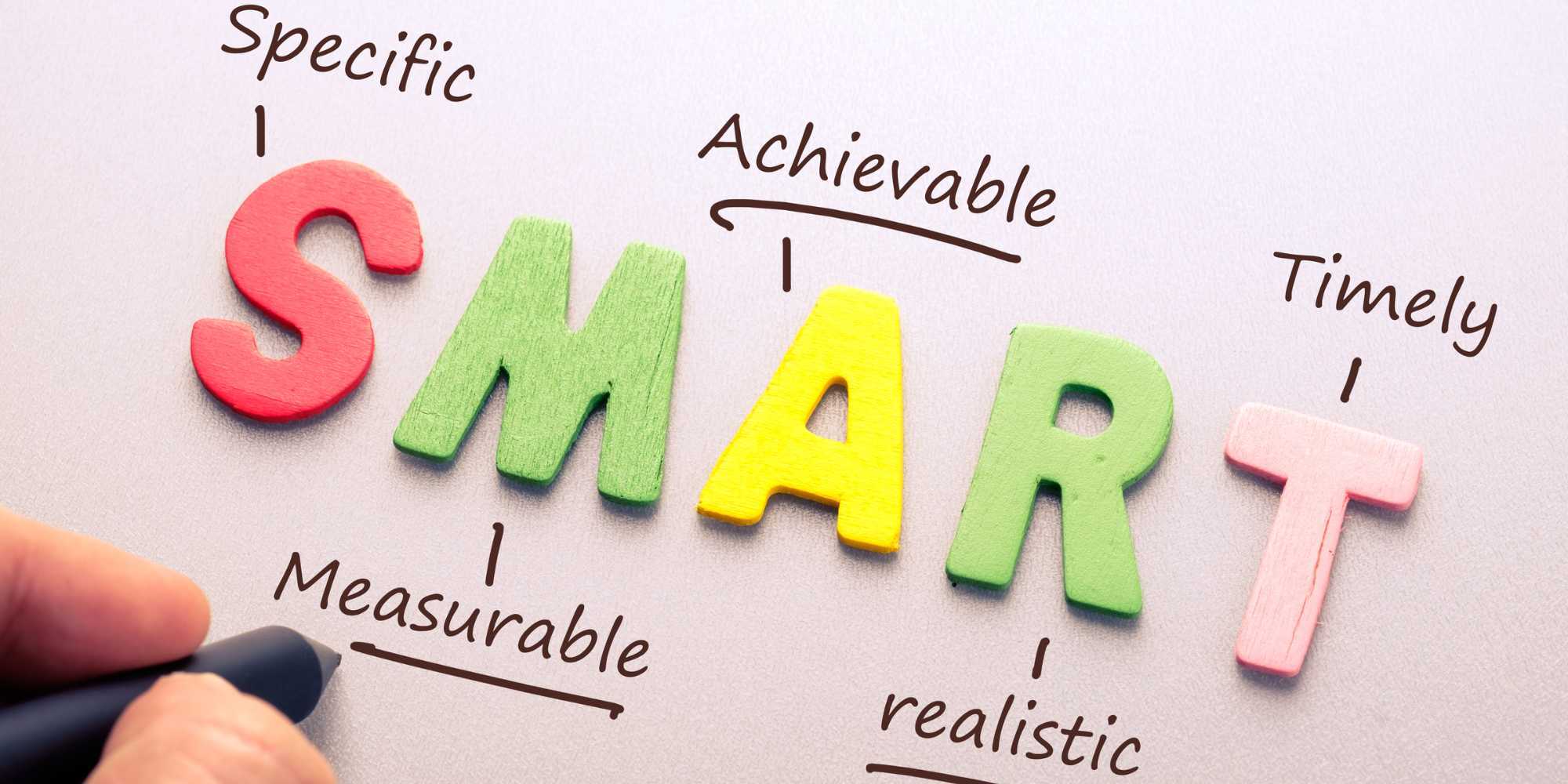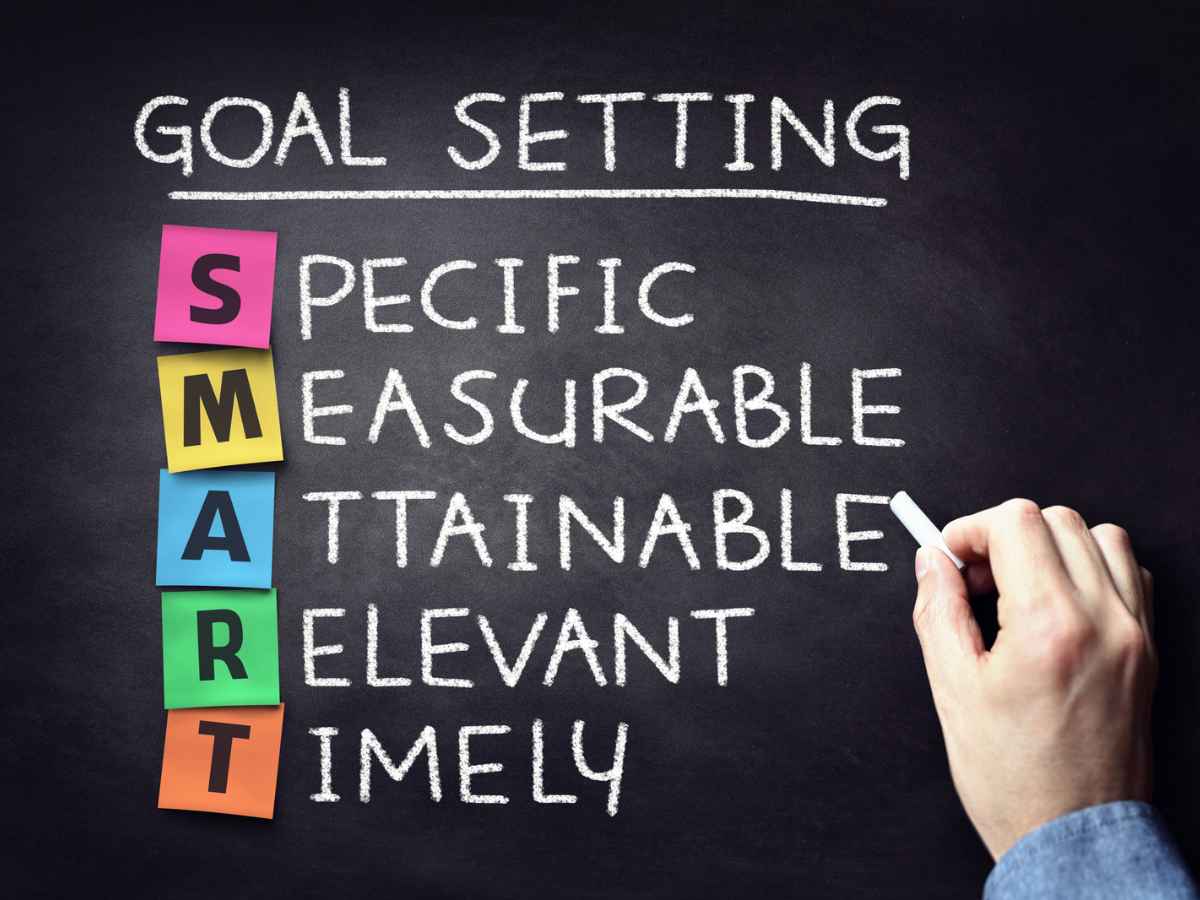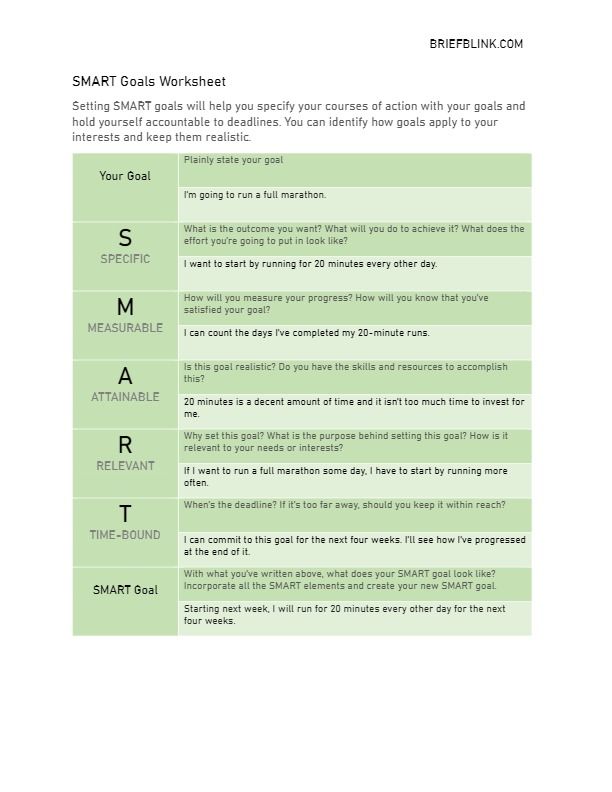Master SMART Goals for Personal Development (with Examples)
The SMART goals method is an effective way to create manageable personal goals. SMART personal goals offer you a clear and structured framework for goal setting. Read to learn why you should set SMART personal development goals. Learn how to set them with 5 practical SMART personal goal examples.

The importance of effective goal setting
Governments, businesses, and leaders rely on effective goal-setting. Having effective goals gives us clarity and direction. They help us focus efforts towards achieving outcomes. We work more efficiently and effectively when we know what we have targets. Goals provide us with the motivation to achieve something we desire.
Goals are important in our career growth and personal development. Personal development goals are crucial for us to become our best selves. They give us a sense of purpose and reasons to work hard towards improvement. They keep us accountable. We need them to push ourselves. When we accomplish them, we experience joy, excitement, and satisfaction. But how do we create effective goals?
Enter SMART goals. Working with a SMART goal is like having a personal GPS. It guides you to your desired destination. Imagine embarking on a thrilling journey, a journey towards personal growth. Instead of wandering aimlessly, you could be the captain of your own ship. You can chart a course towards your dreams with confidence and precision. That's the power of SMART goals.
What are SMART Goals?
SMART goals are a 40-year-old concept. They help us define clear and measurable objectives [1]. For four decades, the SMART framework has served as a universal goal-setting language. It’s grown into a robust tool that assists many people.
SMART goals help us by providing a clear picture. Their use has enabled the systematic achievement of objectives across different industries. They provide focus, clarity, and direction. They can also help identify potential obstacles and develop strategies to overcome them.
What’s in the SMART Framework?

We can break down the SMART goal framework into five concepts. The acronym (SMART) stands for:
- Specific
- Measurable
- Achievable/Attainable
- Relevant
- Time-bound/Timely
These are the elements that see goal-setting through a pragmatic lens. Let’s take a more in-depth look at each component.
Specific
Think about the outcome you want clearly. Consider what you will do to achieve it. A specific goal describes not only the outcome. It also tells us how we go about achieving it. You can use specific and well-defined goals to focus your efforts more effectively.
Instead of saying "I want to get fit," a specific goal would be "I want to run 5 kilometres without stopping." By defining what you want, you can visualize and plan for your success.
Measurable
Consider how you’ll measure your progress towards meeting your goal. Use a tangible figure, number, or measurement. These concrete benchmarks will allow you to see if you’ve met the goal. It can also show you what’s left in achieving it. As that gap between you and your goal narrows, your motivation will snowball.
If “being happy” was a goal, how will you know when you've achieved it? Maybe you decide that being happy means meditating for 15 minutes a day, or spending quality time with loved ones three times a week. These are measurable and give you a clear goalpost of success.
Achievable
Are the goals you set for yourself realistic? You, with your current abilities and resources, have to be sufficient for your goals. Don’t strive for the impossible. Setting achievable goals allows you to stick to them.
Consider breaking your goals into smaller milestones. Set your sights for the closest hilltop instead of the mountain peak.
Relevant
Why do you want or need these goals? Your goals need purpose. In corporate strategy, a relevant goal would support a company’s overall direction. In environmental policy, a relevant aim would align with wider environmental conservation efforts.
Goals should be more than numbers you want to meet. They have to inspire you. Make them relevant to your personal development. Setting goals that don't align with your values makes it difficult to stay motivated and invested in accomplishing them.
Time-bound
When do you need to accomplish your target? Set a deadline for when you want your goals accomplished. Doesn't need to be soon, but not too far off. Setting a firm deadline prevents us from procrastinating.
Deadlines act as cheerleaders that pressure you towards your goals. Studies suggest that as time progresses towards deadlines, our motivation to act increases [2]. SMART goals are great for time management.
Using SMART Goals for Personal Development
SMART goals aren't just beneficial for businesses or organisations. They're equally practical for personal development. Personal development refers to improving oneself. Activities that enhance self-awareness, knowledge, skills, and overall wellbeing are key in personal development. But why should we use SMART goals for personal development?
Why are SMART goals important for personal development?
Just as a map guides a traveller to their destination, SMART goals guide us on our personal development journey. They act as a blueprint, helping us identify where we currently stand and what we need to do to get where we want to be.
Break down larger life objectives
Long-term milestones a year away often make the work we put in every week seem pointless. SMART goals help us break down larger life objectives into micro goals.
Micro goals are bite-sized, realistic, and more manageable. This makes our personal development goals less overwhelming and more achievable. We’re more likely to stick to any action plan we set.
Provide a clear path
SMART goals provide a clear path. We’ll know exactly what we need to do in order to achieve our goals. We can track our progress along the way. This clarity can boost our motivation and commitment. We’re more likely to persist in the face of setbacks.
When we can see that we’re making progress, it can be really motivating! It helps us to stay committed to our goals, even when things get tough. And let’s face it - setbacks are a normal part of any journey. But when we have clear goals, we’re more likely to keep going, even when things don’t go exactly as planned.
Gives us a sense of purpose
Have you ever felt like you're not good enough? Have you ever thought that you're not achieving your full potential? You’re not alone. It's a common feeling, but setting SMART goals can help change that.
In setting personal development goals, we give ourselves something to strive for and work towards. This can boost our self-esteem and give us a sense of accomplishment when we reach our goals.
Research in positive psychology suggests that setting and striving for personal goals can contribute to our sense of purpose [3]. Goals help increase our self-esteem and improve our mental health. SMART goals can help us maximise our potential and give us a more fulfilling life.
SMART Goal Examples for Personal Development
It’s time to illustrate the power of SMART personal development goals with examples. I’ve chosen these 5 topics because they are widely relevant to most people’s personal development and career growth. Let's look at setting SMART personal development goals in:
- Getting fit for a marathon
- Stress management with self care
- Being more productive
- Developing research skills
- Writing a book
1. Getting fit for a marathon
SMART goals are great for fitness goals. A SMART goal for running a marathon might be:
I will run a 42-kilometre marathon in 6 months by running for 30 minutes five times a week, gradually increasing my time and distance by 10% each week.
This goal is:
- Specific: You are clear about wanting to run a marathon. You’ve stated what you’re going to do to prepare for the marathon.
- Measurable: The duration of your runs and training frequency provide measurable benchmarks.
- Achievable: Assuming you are in good health and have the time to train, this goal is realistic.
- Relevant: This goal aligns with your desire for physical fitness.
- Time-bound: You have set a six-month deadline for your goal.
2. Stress management with self-care
You’re concerned with your mental wellbeing. Incorporating self-care activity into your routine might help reduce your stress levels. A SMART goal could be:
To decrease my stress levels, I will meditate for 20 minutes every morning before work for the next two months.
This goal is:
- Specific: You aim to reduce stress through meditation. You’re clear on how when you’re going to meditate.
- Measurable: The duration of each meditation session and the time frame make it quantifiable.
- Achievable: You've chosen a manageable form of self-care. 20 minutes a day is a reasonable amount of time.
- Relevant: Meditation is a great way to reduce stress [4].
- Time-bound: You've set a two-month period for your goal.
3. Being more productive
You have a bunch of tasks to complete, but procrastination, among several other things, is holding you back. Answering emails, managing projects, and meeting clients in a back-to-back fashion with no system in place.
You need to set a goal that allows you to be more productive and tick off those tasks. A possible SMART goal could be:
I will increase my productivity by completing three high-priority tasks each workday before checking my email, for the next two weeks.
This goal is:
- Specific: You state the number of tasks you need to complete before checking your email.
- Measurable: You can track the completion of tasks each day..
- Achievable: This will probably only require a minor change to your routine for a short period.
- Relevant: This goal aligns with your desire to be more productive. You’re going to get more done in the day by adding order to your routine.
- Time-bound: You only have two weeks to use and adopt this system before assessing how it’s made you more productive.
4. Developing research skills
You’re a scholar. You want to improve your research skills to get a better understanding of the current developments surrounding your field of study. A SMART goal might be:
To enhance my research skills, I will complete an online research methodology course within the next 3 months.
This goal is:
- Specific: You aim to improve your research skills by completing this course and all its components.
- Measurable: Completing the course will mark achievement of the goal by the end of 3 months.
- Achievable: Taking an online course is easy with access to the internet.
- Relevant: The goal of improving research skills and this course are in line with each other.
- Time-bound: You've set a three-month deadline to finish the course.
5. Writing a book
Whether you’re an aspiring author or a procrastinating writer (ahem George R. R. Martin), you can set goals for yourself to keep you on track for your next book release. You need to build consistency and enforce accountability.
A SMART goal for this could be:
I will write a 300-page novel within a year by writing at least three pages per day.
This goal is:
- Specific: You aim to write a novel of a specified length. You’ve specified the number of pages you’d write every day.
- Measurable: The daily and total page count provides concrete metrics.
- Achievable: Writing three pages per day is a significant but manageable target.
- Relevant: This goal aligns with your desire to write a book.
- Time-bound: You've set a one-year deadline to complete your book. That’s perfectly reasonable if you want to work on another book next year.
By applying the SMART framework to these personal development goals, you can see how it provides clarity, structure, and motivation. Whether you're aspiring to run a marathon or write a book, SMART goals can help turn your ambitions into reality.
Extra Tips on Setting SMART Goals
Adopt an approach-based mindset
Goals that are approach-based, rather than avoidance-based, are more practical [5]. It's important to set goals that focus on what you want to achieve instead of what you want to avoid. Set a goal about something you will do, rather than something you want to stop doing.
For example, instead of saying "I won't eat junk food anymore," try setting a goal like "I will eat more fruits and vegetables every day." This way, you have a coherent plan of action. You’ll have something positive to work towards. By setting approach-based goals, you can feel more motivated and confident in your ability to succeed.
Share about your goals
It's tough to stick to our goals sometimes. That's why it's important to have a support system. One way to build that support system is by telling someone about your goals. This could be a friend, family member, or even a coworker.
When you share your goals with someone, they can help keep you accountable. They might ask how you're doing on your progress or offer words of encouragement when you're feeling discouraged.
Plus, it feels good to have someone cheering you on! So don't be afraid to share your goals with someone you trust. It might just make all the difference in achieving them.
Start setting your own SMART personal development goals
Setting SMART goals is an effective way to turn your aspirations into reality. By making your goals Specific, Measurable, Achievable, Relevant, and Time-bound, you can create goals that stick.
Remember to break your goals down into smaller, achievable steps and track your progress along the way. Don't be afraid to adjust your goals as you go, and always celebrate your successes, no matter how small.
To get you started, I've created a template (see below) to help get you started. It's ready to download and yours to mess around with.

FAQ
What’s the difference between a goal and a SMART goal?
A goal is a general statement about what you hope to achieve. A SMART goal, on the other hand, is a well-defined objective that meets specific criteria (Specific, Measurable, Achievable, Relevant, and Time-bound). Applying it increases your chances of accomplishing your objectives.
Why are SMART goals important for personal development?
SMART goals are important for personal development because they provide a clear path to achieving your goals. By setting goals that are specific, measurable, achievable, relevant, and time-bound, you are more likely to stay focused and motivated. This will increase your chances of success.
What are some common pitfalls when setting SMART goals?
Common pitfalls include setting goals that are too vague, not measurable, unrealistic, irrelevant to your broader aims, or lacking a clear deadline.
Can SMART goals change over time?
Yes! In fact they should. Your circumstances and priorities will change over time. Your SMART goals should be adjusted to match your needs. Remember to periodically review and update your goals. Ensure they remain relevant and achievable.
How often should I review my SMART goals?
This depends on the context of your SMART goal. It's a good practice to review your goals at least every few months. You may need to review them more frequently if they are for shorter periods. Regular review helps you stay on track and make adjustments as necessary.
Can I have multiple SMART goals at the same time?
Yes. Having multiple SMART goals at the same time works. You’ll manage as long as they’re well-defined and you have the capacity to work towards all of them. Keep in mind, your goals shouldn’t conflict with each other.
What should I do if I’m not making progress towards my SMART goal?
Reassess your goal. It might not be as achievable as you thought. Perhaps your circumstances have changed. Adjust your goal as needed. Create a new plan of action.
Let's learn together
Thank you for reading. Sign up for our weekly newsletter to receive to the latest blog posts, updates, and more delivered straight to your inbox. Don't miss out on valuable insights, useful tips, and fascinating discussions. Join the growing Brief Blink community today and elevate your understanding to new heights.

